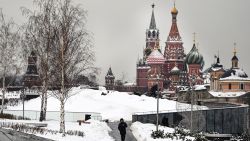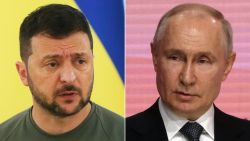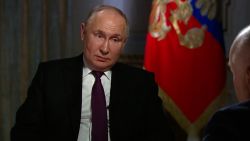Editor’s Note: Roman Badanin is a Russian journalist, researcher, founder and editor in chief of the Proekt and Agentstvo media outlets; former digital editor in chief of Forbes Russia and former editor in chief of the Dozhd TV channel and the RBC news agency. The views expressed in this commentary are his own. View more opinion on CNN.
Six months ago, I was forced to leave my home in Russia to avoid the threat of prison. My crime? Being an independent journalist. Three years ago, I set up an investigative reporting site called Proekt, which brought down upon me and our staff the full force of the repressive apparatus set up by President Vladimir Putin to silence any critical media.
First, we were charged with criminal libel by the Russian Ministry of the Interior for an article about corruption in Putin’s inner circle. The investigation is still ongoing.
At various times our journalists were detained and interrogated by police and Proekt was declared an “undesirable organization” by the Prosecutor General. Most of our employees, including me, were also labeled as “foreign agents.” (Our company is registered in the United States, so any salary paid to our employees counts as foreign funding.)
In July, 2021, facing the inevitable threat of a prison sentence, I went into exile in the United States.
Since then, I have continued my mission from abroad, setting up a Russian-language investigative newsroom. But even now, my family and I are afraid every time someone knocks on our door – it was with this sound that the police searched my Moscow apartment in June 2021.
The search was for no reason other than to intimidate me. Eight police officers entered my apartment and those of two of my colleagues. They turned the apartment upside down, confiscated all my gadgets, and all documents written in English, including my marriage certificate and business cards of my university peers from Stanford.
Until recently, I did not understand why such harsh repressions fell upon my team and other journalists. But on February 24, it became clear. Putin was preparing the country for an unjust war in Ukraine by eliminating all critical voices within Russia.
But even that was not enough. When the invasion began, the Russian authorities clamped down further – outlawing, closing or blocking almost all independent media remaining in Russia. Any Russian journalist who even uses the word “war” about what is happening in Ukraine – what Putin deems a “special military operation” – is labeled an enemy of the Russian president, and the target of a new “fake” news law threatening imprisonment of up to 15 years.
Several international media outlets, including CNN, have also suspended their work in Russia to protect their journalists. Though the BBC cautiously continues its English language reporting, and announced it would resume short-wave radio broadcasts of its Russian service to Ukraine and parts of Russia – as it did during the Cold War, and before that, in broadcasting news into Nazi-occupied Europe.
A lot of Russians get their news from foreign-owned social media services, including Facebook, Instagram and Twitter. But access to information from these services has been restricted by both Russian government action and by the steps taken by tech companies caught between the risks of new restrictive Russian laws and international sanctions.
Police now even check the smartphones of Muscovites, reading through text messages and group chats in search of “forbidden information.” This, it seems, is beyond even the darkest days of Soviet censorship.
What happens next is not clear. Russia is still a long way from being able to establish a Chinese-style Great Firewall to suppress all critical information appearing on internet services. The country has a so-called “sovereign Internet” law, put into force in 2019 and allowing the Kremlin to cut off the country from access to the global network at any time. Parts of this law are already being applied now.
My relatives living in Moscow cannot read a single honest article about what is happening in the country, unless they use a VPN service. But now the Russian authorities are blocking VPNs as well. The same may soon happen with Telegram, one of the most popular and yet unblocked messenger service in Russia.
What can the West do in this situation? The short answer is to guarantee free access to information for Russians as much as possible. Those technology companies that are now cutting off Russia from their services are playing into the hands of Putin. These are not the kind of sanctions that are needed to stop the war in Ukraine and ultimately defeat Putin’s dictatorship.
As a journalist, and not a tech expert, I can list only a few technological solutions to breaking through to reach my fellow Russians. Satellite Internet, affordable and cheap VPN services, secure email services and messengers – this is what is needed now to help end the war.
But what is needed even more is willingness of the global tech giants to hold the line in resisting Putin’s pressure to shut down critical voices. And they need to use their much vaunted innovative and entrepreneurial talents to do what they can to break through Putin’s new Iron Curtain.
Get our free weekly newsletter
There is still time to stand up to him and avoid the worst. To do so, we should not only support Russia’s independent journalists but, critically, save the information landscape in which they operate. Russians – and the world – deserve to know the truth.





















